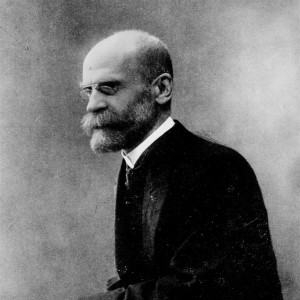Émile Durkheim quotes - page 2
Émile Durkheim was a French sociologist and one of the principal founders of modern sociology. His work focused on how societies maintain their coherence and the role of collective consciousness. He greatly influenced the study of social institutions and the development of sociological methodology. Here are 63 of his quotes:
At the roots of all our judgments there are a certain number of essential ideas which dominate all our intellectual life; they are what philosophers since Aristotle have called the categories of the understanding: ideas of time, space, class, number, cause, substance, personality, etc. They correspond to the most universal properties of things. They are like the solid frame which encloses all thought: this does not seem to be able to liberate itself from them without destroying itself.

Émile Durkheim
The category of class was at first indistinct from the concept of the human group; it is the rhythm of social life which is at the basis of the category of time; the territory occupied by the society furnished the material for the category of space; it is the collective force which was the prototype of the concept of efficient force, an essential element in the category of causality.

Émile Durkheim
But the division of labor is not peculiar to the economic world; we can observe its growing influence in the most varied fields of society. The political, administrative, and judicial functions are growing more and more specialized. It is the same with the aesthetic and scientific functions. It is long since philosophy reigned as the science unique; it has been broken into a multitude of special disciplines each of which has its object, method, and thought. "Men working in the sciences have become increasingly more specialized.

Émile Durkheim
If I do not submit to the conventions of society, if in my dress I do not conform to the customs observed in my country and in my class, the ridicule I provoke, the social isolation in which I am kept, produce, although in an attenuated form, the same effects as punishment in the strict sense of the word.

Émile Durkheim
In short, all suicides of the insane are either devoid of any motive or determined by purely imaginary motives. Now, many voluntary deaths fall into neither category; the majority have motives, and motives not unfounded in reality. Not every suicide can therefore be considered insane, without doing violence to language.

Émile Durkheim
A society whose members are united by the fact that they think in the same way in regard to the sacred world and its relations with the profane world, and by the fact that they translate these common ideas into common practices, is what is called a Church. In all history, we do not find a single religion without a Church.

Émile Durkheim
Man seeks to learn, and man kills himself because of the loss of cohesion in his religious society; he does not kill himself because of his learning. It is certainly not the learning he acquires that disorganizes religion; but the desire for knowledge wakens because religion becomes disorganized.

Émile Durkheim
Émile Durkheim
 Occupation: French Sociologist
Occupation: French Sociologist
Born: April 15, 1858
Died: November 15, 1917
Quotes count: 63
Wikipedia: Émile Durkheim













